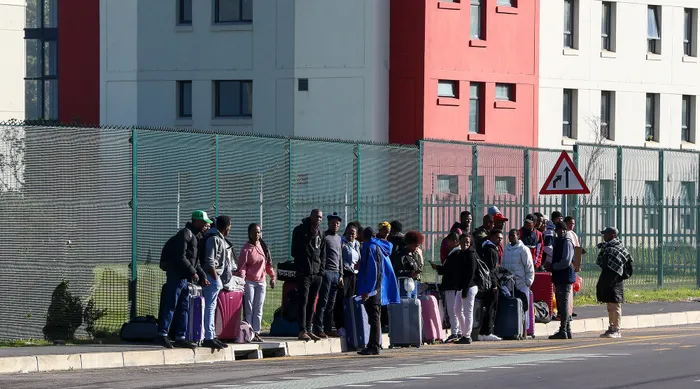NSFAS CEO blames poor planning and corruption for student accommodation crisis

NSFAS has blamed poor planning, weak communication, and housing shortages for the student accommodation crisis, as concerns grow over safety, sanitation, and infrastructure.
Image: Pictures: Leon Lestrade. African News Agency/ANA.
Poor planning, weak communication, and a lack of adequate student housing are the primary factors contributing to the NSFAS-funded accommodation crisis at higher education institutions across the country, NSFAS CEO Waseem Carrim stated on Wednesday.
This comes as students across institutions of higher education continue to voice their concerns over the safety and quality of NSFAS-accredited accommodation, particularly issues such as inadequate sanitation, poor infrastructure, and a lack of security.
The issue has been ongoing for years, with little progress on addressing the matter.
Speaking during a media briefing on Wednesday afternoon in Pretoria, Carrim outlined two main structural challenges facing student accommodation in South Africa.
“Relating to student accommodation, I think primarily there are two structural issues we face,” he said.
“The first is that, particularly in rural areas, we do not have sufficient, safe, secure student accommodation to meet the demand that exists.”
Carrim added that while the shortage is a challenge, it also presents an opportunity.
“We know the country experiences low economic growth, and we know that infrastructure is one of the driving forces of economic growth,” he said.
“We intend to support various stakeholders to ensure we construct enough student accommodation.”
He clarified that NSFAS would not be directly involved in construction, but would act as a “supporting mechanism in the ecosystem” to help ensure there is sufficient accommodation.
The second issue, Carrim said, relates to inefficiencies in how existing student accommodation is allocated.
“For some reason, we don’t seem to allocate existing student accommodation in an efficient and effective manner,” he said.
“Our planning and our communication have not necessarily been the best in the past.”
Carrim stressed the need for proactive planning ahead of the 2026 academic year.
“We know what our forecasts are in terms of students and NSFAS beneficiaries, and how many are likely to qualify for accommodation or transport,” he said.
“Even before the end of 2025, we should have a plan with each institution of higher learning about where NSFAS beneficiaries will be accommodated going into the year.”
He warned that institutions should not accept students if no suitable accommodation plans are in place.
“If you don’t have a plan, you should not be taking in those students and exposing them to unsafe conditions, especially at the young and vulnerable age that our students are.”
Carrim also acknowledged that corruption remains a serious concern within NSFAS.
“Of course, we know there have been many instances of corruption, not only in the administration of bursaries or loans but also across the accommodation sector,” he said.
He added that the NSFAS board is committed to working with relevant authorities, including the Auditor-General, Public Protector, law enforcement, and the Special Investigating Unit (SIU).
“The SIU has already helped NSFAS recover close to R1.8 billion,” he said.
“We will continue to work with them to recover any lost funds and ensure they are used correctly to support students.”
On Wednesday, IOL News reported that Carrim revealed the scheme is owed R45 billion in outstanding student loans.
He urged former beneficiaries to begin repayments.
The loans date back to 2018 and earlier, issued by NSFAS and its predecessor, the Tertiary Education Fund of South Africa (TEFSA).
NSFAS, established in 1996, took over from TEFSA, which had administered financial aid since 1991 until it was converted into a statutory body in 1999.
Carrim admitted that NSFAS has historically struggled with debt recovery.
“It has not had the best debt management strategy. But we cannot, as a board and management, continue to sit on that substantial amount of debt and not collect it,” he said.
He said that many past beneficiaries are now employed and capable of repayment.
“We know that the majority of graduates in South Africa are employed. Therefore, our view is that students who took up loans, graduated through the fund, and are now employed must repay their debt - not only to NSFAS but to society as well.”
Carrim stressed that funds recovered through loan repayments would go towards supporting new students in need of financial aid.
This comes after ongoing hardships for many students at public institutions, including delays in allowance payments, unresolved applications, and poor communication - leaving some unable to meet basic needs such as food and housing.
Meanwhile, NSFAS board chairperson Karen Stander confirmed that the fund is contacting former loan recipients from before 2018, reminding them of their contractual obligation to repay once earning more than R30,000 per year.
“The minimum monthly repayment amount is determined by income level,” she said.
“Debtors earning above R30,000 per year who are not currently making the minimum repayments may have their accounts handed over to an External Debt Collector (EDC).”
Stander announced that, as of August 2025, NSFAS has officially appointed several entities to act as authorised EDCs to recover outstanding debt.
IOL News